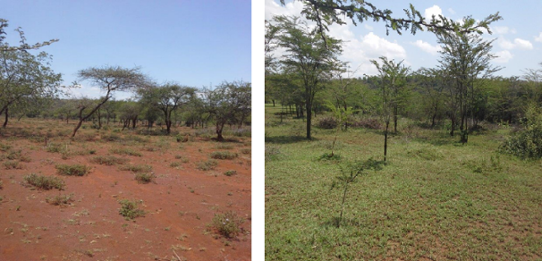Backround
A large majority of rural households in Kenya rely on biomass energy in order to meet their basic energy needs. Firewood and charcoal burning are one of the main drivers of deforestation and the smoke that emanates from cooking using open fire has proved to be the leading cause of respiratory diseases. Modern energy efficient stoves can save up to 50 percent on fuel wood in comparison to open fires.
The reduction in firewood consumption contributes both to the conservation of forest vegetation and to the reduction of CO2-emissions a major contributor to climate change. The project addressed the issues of deforestation in combination with Farmer Managed Natural Regeneration (FMNR), a low-cost, sustainable land restoration technique used to combat poverty and hunger amongst poor subsistence farmers in developing countries by increasing food and timber production, and resilience to climate extremes.
Description
To reduce deforestation and to increase the use of modern energyefficient stoves, community barazas* were organized with support of the administrative authorities to inform about FMNR and more efficient stoves. Lead farmers and school environmental club patrons were trained to train other farmers at their village. In Elegeyo Marakwet 500 lead farmers (56 % male, 44 % female) were trained in total, each reaching out to a further five farmers, resulting in 2500 farmers in total trained in FMNR and energy efficient cook stoves.
Impact
As a direct result of the project, 1250 acres of land are restored under FMNR. The FMNR approach aims at restoring the degraded land by enhanced tree growth which can be used as fire wood. Another effect of a restored tree cover is increased soil fertility which again is increasing the harvest and by this decreasing the risk of poverty and famine. FMNR implies a reduction in deforested land which as a consequence in future will contribute to economic, social and environmental benefits of the farmers and the community.
Lessons learned
Proper planning including clear target, selection criteria and resource availability is the key to the success of a project.
Women, children and youth are key drivers in climate change mitigation and adaptation activities, as they are the most affected by severe impacts of climate change.
*Baraza is a Swahili word meaning to convene or to bring together a conference of great social importance aligned to the governance and well-being of the society or the village.
